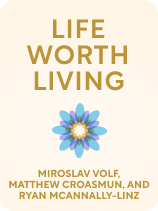

This article is an excerpt from the Shortform book guide to "Life Worth Living" by Miroslav Volf, Matthew Croasmun, and Ryan McAnnally-Linz. Shortform has the world's best summaries and analyses of books you should be reading.
Like this article? Sign up for a free trial here.
Would you like to have your own life philosophy? Where should you start? What should you consider?
In Life Worth Living, authors Miroslav Volf, Matthew Croasmun, and Ryan McAnnally-Linz discuss the value of having a philosophy of life. They offer bite-sized chunks of various life philosophies to use as a springboard for building your own.
Continue reading to learn how to make your own philosophy in life with inspiration from Nietzsche, Aristotle, Oscar Wilde, and others.
Make Your Own Philosophy in Life
To help you make your own philosophy in life, the authors explain how contemplation can help you integrate your beliefs into a coherent life philosophy. Then, they describe the four key components of a good life philosophy and share some perspectives from various life philosophies to inspire your thinking.
Contemplation Leads to Integration
Since Volf, Croasmun, and McAnnally-Linz believe that your life will feel more meaningful if you have a life philosophy that resonates with you, they argue that you should contemplate your life philosophy. They explain that this can be a complicated process—not just because there are so many ideas to sift through, but also because it can be hard to make them all fit together. For example, say you have two potentially conflicting beliefs about what it means to live well: It’s important to proudly be yourself in public, but it’s also important to avoid going to prison. You might have a hard time reconciling these beliefs if, for example, you’re an LGBT person living in a region that criminalizes LGBT activity.
For this reason, the authors recommend that you think carefully about how to weigh each aspect of your life philosophy. (We’ll describe four key aspects in more detail shortly.) They explain that you’re probably not going to get everything to line up perfectly—life is complicated, with a lot of considerations to juggle. They also recommend that you stay open to new wisdom; that way, you can revise your life philosophy if you update your thinking about something.
Finally, Volf, Croasmun, and McAnnally-Linz recommend that you devote time to pondering your life philosophy regularly—perhaps even daily. They explain that setting time aside to think about your life philosophy helps you remember it. There’s no instruction manual for life that you can stop to consult before you make decisions, but if you keep your life philosophy top of mind by intentionally contemplating it often, you’ll be more likely to live well—however you define that.
| Contemplation Practices to Help You Discover Your Life Philosophy Volf, Croasmun, and McAnnally-Linz argue that contemplation helps you discover your life philosophy by enabling you to resolve conflicting beliefs and decide how to weigh your priorities. How does this work? Research suggests that contemplation enhances creative and critical thinking skills. These skills enable you to more efficiently weigh your options, think up simple or innovative solutions, and solve whatever problems you may be facing. Contemplation may also help you become more open-minded by increasing your self-knowledge: When you’re aware of your own thinking patterns, you’re more likely to see the ways your thinking falls short and be receptive to new ideas. The authors also argue that contemplation helps you remember your life philosophy and more easily put it into practice. Memory scientists agree: If you devote a lot of time and energy to thinking about something, you’re more likely to remember it well. You’re also more likely to be able to make connections you wouldn’t otherwise have made if you devote extra time and energy to a topic. This might help you put your life philosophy into practice more efficiently: Say generosity is part of your life philosophy. The more you contemplate generosity, the more likely you are to notice new and uncommon opportunities to practice it. For example, you might start donating to causes and people you wouldn’t have donated to before. Now that you know how contemplation can benefit you, you might be wondering what it looks like in practice. Experts often recommend traditional contemplative practices like prayer, meditation, yoga, or tai chi. Some people find contemplative writing exercises like journaling or freewriting more productive. Finally, you might have contemplative practices that are specifically tailored to help you discover your life philosophy, like the ones Bill Burnett and Dave Evans recommend in Designing Your Life. These include keeping a wayfinding journal and using mind mapping techniques. |
The Four Key Aspects of Your Life Philosophy
As you contemplate your life philosophy, the authors recommend that you focus on four key aspects of life, each an essential component of a well-rounded life philosophy: your existential, emotional, material, and moral welfare. We’ll describe each aspect in more detail now. We’ll also include some perspectives on each aspect from various life philosophies the authors describe—you can use these as a springboard to jump-start your contemplation or even adopt the perspectives that resonate with you.
Existential Welfare
First, the authors argue that all life philosophies include existential beliefs about what it means to live well (for example, Wiccans believe living well means living in congruence with nature). Since life philosophies also motivate action, a good life philosophy promotes existential welfare—it inspires you to take actions that make you feel good about your existence given your beliefs about the purpose and significance of life on Earth. For example, Wiccans partake in seasonal rituals to honor and reinforce their connection with nature.
The authors note that your life philosophy can promote your existential welfare even if it’s not based in traditional religious beliefs. For example, the authors explain that some atheist scientists incorporate unity in their life philosophies because they believe it furthers human evolution, since humans who work together are more likely to survive and thrive.
To illustrate how your life philosophy can promote your existential welfare, the authors cite Robin Wall Kimmerer. In Braiding Sweetgrass, she writes that some Native American religions hold that human life depends on symbiotic relationships with other lifeforms—for example, we eat plants, and in return, we help plants grow. In accordance with those beliefs, Native American life philosophies promote existential welfare by encouraging you to form respectful, mutually giving relationships with the land you live on and the other lifeforms who live there with you: The idea is that to live well, you have to help others live well, too.
Emotional Welfare
A good life philosophy also promotes emotional welfare. Volf, Croasmun, and McAnnally-Linz explain that, for most people, long-term happiness is an integral part of what it means to live well. If that’s true for you, it makes sense to adopt a life philosophy that factors sustainable happiness into the equation, like utilitarianism. Utilitarianism is a school of thought that argues that pleasure and things that increase pleasure are worthwhile, while pain and things that increase pain are not. All pleasures are equally valuable in this view—it doesn’t matter whether you enjoy playing video games or trying to cure cancer; so long as you’re increasing net pleasure and decreasing net pain, you’re doing something good.
However, the authors explain that, according to some thinkers, utilitarians might be wrong—there may be some value to feeling unhappy at least some of the time. For example, Buddhists believe that all attachments (like the desire for happiness) lead to suffering. So, instead, they pursue enlightenment—placid acceptance of reality. Additionally, when the writer Oscar Wilde was imprisoned for sodomy, he learned the value of unhappiness: It’s an unavoidable part of life, and you have to experience it to really understand it. Therefore, being unhappy deepens your knowledge of what life’s all about. If you agree that unhappy emotions are an important part of life, your life philosophy should reflect that—happiness shouldn’t be your only goal.
Material Welfare
A third component of a good life philosophy is that it promotes material welfare. The authors explain that different thinkers have different standards of material welfare. According to the Greek philosopher Aristotle, material welfare means having access to the resources that enable you to behave morally (you might resort to stealing if you can’t afford to eat, for example) and live comfortably (for example, beauty products might help you enjoy life more). In contrast, Buddhists define material welfare as meeting your minimum survival needs (like food and shelter) and relational needs (like proximity to spiritual teachers). If you have more than that, you might form attachments that hinder enlightenment.
Volf, Croasmun, and McAnnally-Linz also say that your life philosophy should help you understand whose material welfare you’re concerned with. They explain that the German philosopher Friedrich Nietzsche prioritized the flourishing of brilliant people above all else because their work improves the quality of life on Earth. For brilliant people to flourish, they need superior living conditions, which a deprived underclass must work hard (and suffer more) to provide them with. However, many other philosophies advocate different visions of global material welfare. For example, Christians believe God’s love can heal the entire world and bring about universal flourishing.
Moral Welfare
Finally, Volf, Croasmun, and McAnnally-Linz argue that a good life philosophy promotes moral welfare—the sense that you’re generally a virtuous person—by defining right and wrong behaviors. The authors explain that many people believe they’ll be virtuous if they minimize the harm they do to others, but this doesn’t pass muster because sometimes, you must harm others in order to do the right thing. To illustrate, the authors cite the spiritual war depicted in a Hindu text called The Bhagavad Gita. In this scripture, the god Krishna advises a man named Arjuna that he must harm his family to win the war for righteousness and against sin.
If you agree that moral welfare could sometimes demand harming others, your life philosophy might require a different behavioral standard than minimizing harm. One alternative is to judge your actions by their outcomes. The authors explain that utilitarians, for example, don’t care what you do so long as your actions promote pleasure and decrease pain. One problem with this approach is that the repercussions of your actions are often unpredictable. For example, if you’re not aware that some coffees are produced by forced laborers, you can’t predict that your purchase of that coffee might fuel the modern slave trade.
The authors say other thinkers are more concerned with the quality of your actions themselves. For example, the authors say that Jews, Christians, and Muslims believe the only way to act rightly is to obey God (whose will you can determine with the help of your spiritual community). Confucianists, on the other hand, believe that to act rightly is to promote a healthy society, which begins with healthy interpersonal relationships. Therefore, they emphasize treating people well.
Another facet of moral welfare is who you should act rightly toward. The authors describe four answers to this question: First, the philosopher Charles Taylor says you are your highest priority, since you’re an individual, and you have a duty to fulfill your unique potential. In contrast, the utilitarian Peter Singer argues that since everyone’s pleasure is equally important, you should act rightly toward everyone, even perfect strangers. In practice, this could mean donating to poor people in other countries. Somewhat similarly, Christians believe you should act rightly with anyone you encounter, including strangers and people who are different from you. Finally, Confucianists believe that your family comes first but you should treat others well, too.
Exercise: Start Contemplating Your Life Philosophy
Volf, Croasmun, and McAnnally-Linz write that a good life philosophy promotes your existential, emotional, material, and moral welfare. Get a head start on contemplating your life philosophy now.
- What beliefs and aspirations do you already have regarding your existential welfare? For example, maybe you believe people were meant to live in harmony with nature, so you aspire to celebrate seasonal changes.
- What beliefs and aspirations do you already have regarding your emotional welfare? For example, maybe you believe grief is a valuable experience and aspire to handle it in a healthy way.
- What beliefs and aspirations do you already have regarding your material welfare? For example, maybe you value financial stability, so you aspire to contribute to your rainy-day fund each time you get paid.
- What beliefs and aspirations do you already have regarding your moral welfare? For example, maybe you believe that to live morally, you must fight for social justice, so you aspire to educate others about social justice issues.
- Write a brief summary of your current life philosophy by answering the following question: When you grow old and look back on your life, what would make you say it was a life well lived? Make sure to incorporate each aspect of your life philosophy per your previous answers.

———End of Preview———
Like what you just read? Read the rest of the world's best book summary and analysis of Miroslav Volf, Matthew Croasmun, and Ryan McAnnally-Linz's "Life Worth Living" at Shortform.
Here's what you'll find in our full Life Worth Living summary:
- What a life philosophy is and why you should have one
- The four key components of a good life philosophy
- Why contemplating death can motivate you to live more fully







I wonder if these philosophies are good, please let me know
“Don’t give love to beings, only love should be given to arts and education as it gives love back and feels nothing” -Raymond Austin
“As regards to thought, words and actions. what determines a true human than an animal is that a human applies only ethics, logic and good morality, an animal applies emotions and impulses. ” -Raymond Austin
“With love comes hate”- Raymond Austin
“Paradox’s left unchecked is where everything goes wrong”- Raymond Austin
“Good and Evil’s most effective method is inspiration as its elegant and subtle” -Raymond Austin
“Inspiration of goodness normalises the brain to do good, vice versa for Evil” -Raymond Austin
“Do not trust in people but have faith but be aware it can be taken advantage of, if so, accept it and move on that you don’t let yourself down” -Raymond Austin
“The mind needs to kept in the medium between idealism and realism”- Raymond
“For humans to exist good and evil need to exist, if one side falls other follows thus humanity falls”-Raymond Austin
“As long as humanity exists there is good and evil, its matter of which suppresses the other”- Raymond Austin
“Competiveness without honourable sportsmanship is where thing goes wrong” -Raymond
“Games of athletics, boardman electronic is fun, Games of words, expression, violence is destructive to all” – Raymond Austin
“Structures such as laws, legislation, policies mutate with the change of the times, thus become shackles draining life”-Raymond Austin
“A good understanding leads to goodness, a lack of understanding leads to evil”- Raymond Austin
“To have good sense of reality absorb information and assess it accordingly with logic, ethics and good morality only”- Raymond Austin
“A true Human soley relies upon ethics logic and good morality, animal soley relies on emotions and impulsions”- Raymond Austin
“A leaders emotions, impulsions, and desires can lead to his or her downfall bar one desire which the desire to help the people”- Raymond Austin
“Not appealing to recorded and personal history and philosophy leads to the downfall of people and thus history repeats itself”- Raymond Austin